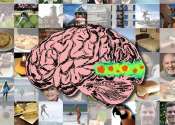Sizing things up: The evolutionary neurobiology of scale invariance
(Medical Xpress)—Visual perception is far more complex and powerful than our experience suggests. Moreover, in attempting to both understand vision and implement it in a computational device, the fact that a species' senses ...









